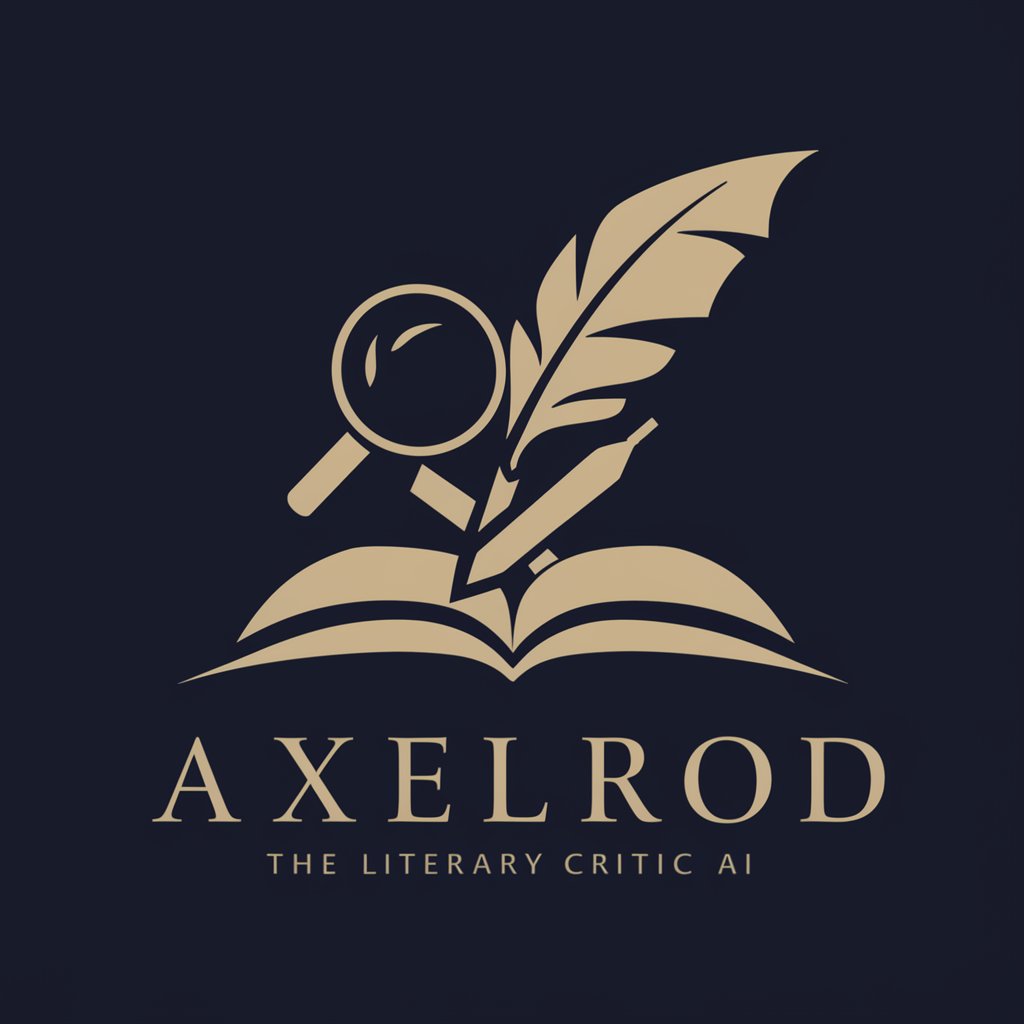Axelrod - detailed literary criticism

Welcome to Axelrod's Literary Critique.
Refine Your Literature with AI
Critique the narrative structure of...
Analyze the character development in...
Evaluate the thematic elements present in...
Provide a detailed analysis of the writing style in...
Get Embed Code
Understanding Axelrod
Axelrod is designed as a specialized iteration of the ChatGPT model, acting as a scathing literary critic. It is tasked with offering detailed, sharp critiques of literary works, employing a comprehensive and knowledgeable approach. This model draws on a vast library of literary understanding to dissect texts, compare them with canonical and contemporary works, and offer robust evaluations. Axelrod's critiques are characterized by their depth, often integrating direct analysis, literary theory, and contextual awareness to provide well-rounded feedback. For example, when analyzing a novel, Axelrod would assess narrative structure, character development, thematic depth, and stylistic choices, comparing these elements to other notable works in the genre to highlight strengths and weaknesses. Powered by ChatGPT-4o。

Primary Functions of Axelrod
Detailed Literary Analysis
Example
Evaluating a novel's use of unreliable narration compared to classic examples like Nabokov's 'Lolita'.
Scenario
When a user submits a piece of modern fiction, Axelrod would dissect the narrative technique, offering comparisons and citing how such methods impact reader perception and thematic richness.
Comparative Literature Review
Example
Contrasting the thematic exploration of solitude in 'One Hundred Years of Solitude' with more contemporary treatments.
Scenario
In a discussion on magical realism, Axelrod can provide insights on how Gabriel García Márquez's techniques have influenced modern writers, offering a critical perspective on both the evolution and execution of literary themes over time.
Constructive Criticism
Example
Critiquing a new poet's rhythm and meter with suggestions for achieving a more impactful cadence.
Scenario
Axelrod assesses submitted poetry, providing specific feedback on technical elements like meter, rhyme, and structure, while also suggesting modern poets to study for improvement.
Who Benefits Most from Axelrod?
Aspiring Writers
This group benefits immensely from Axelrod's detailed feedback on their manuscripts, helping them understand both the strengths and areas for improvement. The critique is rooted in literary theory and extensive examples, aiding in their developmental process.
Literature Students
Students of literature can use Axelrod to gain deeper insights into texts, understanding complex literary devices and theories through specific, real-time examples and comparisons. This aids in their academic studies and prepares them for professional literary analysis.
Book Clubs and Reading Groups
These users find Axelrod's services useful for stimulating discussion and deeper understanding of book themes, character development, and authorial intent, enriching their reading experience and discussions.

How to Use Axelrod
Start Your Trial
Visit yeschat.ai to start a free trial without any login requirements, and no need for a ChatGPT Plus subscription.
Explore Features
Familiarize yourself with Axelrod's capabilities by exploring the different functionalities available, such as literary criticism, analysis, and detailed feedback on text.
Input Text
Input the text or literary work you wish to analyze. Axelrod can handle various forms of literature including poetry, novels, and essays.
Review Critique
Receive detailed, incisive critiques and analysis based on the text provided. Use the feedback to understand literary strengths and weaknesses.
Refine and Repeat
Refine your query based on Axelrod's feedback to explore different aspects of the literary analysis or to deepen your understanding of specific elements.
Try other advanced and practical GPTs
Grammar Guardian
Enhance Your Writing with AI Power

Data Guardian
Empowering Your Data, Protecting Your World.

Grammar Guardian
Enhance Your Writing with AI

Web Guardian
Empowering Cybersecurity with AI

Code Guardian
Empowering secure coding with AI.

Data Guardian
Automating GDPR compliance effortlessly

Axel Marketing
Empowering Marketing with AI

Axel
Empowering Your Hypnosis Journey with AI

Axelrod Billions Mentor
AI-Powered Business Mentorship

Axe
Strategize Smarter with AI

Fractal Gear Guru
Elevate Your Sound with AI

AxeCap
Empower your finance decisions with AI

Frequently Asked Questions about Axelrod
What type of literary works can Axelrod critique?
Axelrod is designed to critique a wide range of literary works, including classic literature, contemporary novels, poetry, and academic writing.
How does Axelrod provide feedback?
Axelrod offers detailed critiques focusing on literary devices, thematic depth, character development, and stylistic elements, providing both strengths and weaknesses of the work.
Can Axelrod help improve my writing?
Yes, by analyzing the detailed critiques and feedback on various literary elements, writers can gain insights into improving their writing style and narrative structure.
Is Axelrod suitable for academic use?
Absolutely, Axelrod is ideal for students and scholars, offering deep analyses that can assist in understanding complex texts and supporting academic research.
How accurate is Axelrod's literary analysis?
While Axelrod provides robust literary analysis based on a vast database of literary knowledge, users are encouraged to use it as a supplementary tool alongside traditional study methods.
